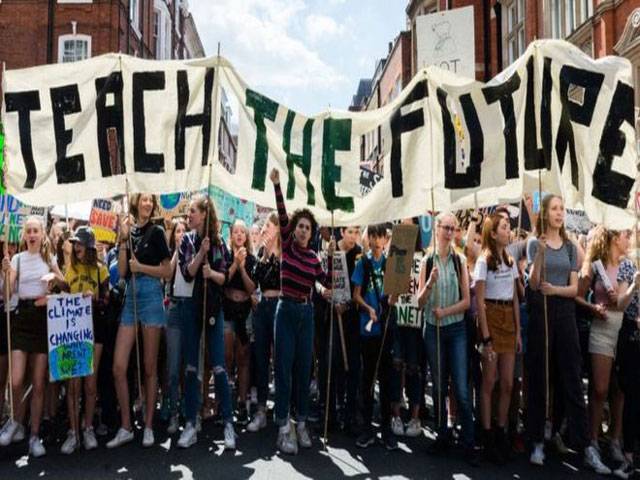LONDON-“It’s educated people who are causing the most damage to the planet,” says sixth-former Joe Brindle. Joe, 17, says schools need to put the environment at the heart of education.
Ministers agree “it is vital that pupils are taught about climate change” but Joe says schools are failing to prepare them for a climate emergency. He is a founder member of Teach the Future which next week takes its call for an environmental overhaul of education to Parliament.
“It’s people with degrees from Oxford and Cambridge who are becoming fossil-fuel chief executives and they are the ones who are causing the most destruction to our world,” says Joe.
“And therefore that kind of shows that education is not succeeding and that our education is broken because education should be creating better people not worse.”
On Wednesday, Joe, a pupil at Devizes School, and more than a dozen other under-18s who make up the core of Teach the Future, will take over Parliament’s Terrace Pavilion to host a crowdfunded reception for MPs.
The group, run jointly by the UK Student Climate Network, best known for the school climate strikes, and the National Union of Students’ climate charity offshoot, SOS-UK, is launching a draft English emergency education bill which embodies their key demands and which Joe believes “is going to be really big”. Teach the Future is hoping the draft could at some stage form the basis of a private member’s bill but for now, the aim is “to get MPs on our side”.
The idea is based on the 1958 US National Defense Education Act which aimed to kickstart engineering, maths and science education and give America the edge in the space and arms races.
It paid off - by July 1969, the average age in Apollo mission control was just 28. “I think it really shows that education can be used to solve a difficult problem, if the focus is down from the government,” says Joe, who will sit A-levels in history, biology and chemistry this summer. But rather than focusing exclusively on science, technology, engineering and maths - the range of the climate emergency education act needs to be far wider, he believes.
“The space race was just one thing but the climate crisis affects every single part of everything and it requires solutions from every single part of society, whether it be arts, whether it be maths, whether it be sciences.”
Sunday, May 19, 2024
Climate change: Schools failing us, say pupils

3:15 PM | April 24, 2024
2:23 PM | April 24, 2024
NEPRA’s Neglect
May 19, 2024
Colonial Grip
May 19, 2024
Confrontational Politics
May 19, 2024
Sports & Genocide
May 18, 2024
Healing AJK
May 18, 2024
Unsung Heroes of Society
May 19, 2024
Water Shortage in Our Area
May 19, 2024
The AI Trap
May 19, 2024
Continuing Narrative of Nakba
May 18, 2024
Teacher Struggles
May 18, 2024
ePaper - Nawaiwaqt
Advertisement
Nawaiwaqt Group | Copyright © 2024





